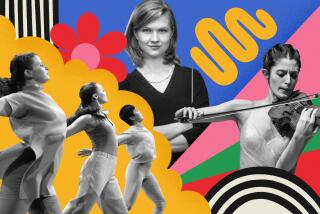China Is Getting Into the Swing of Pops
- Share via
BEIJING — Not far from the Great Hall of the People, where he once performed revolutionary songs for the wife of Mao Tse-tung, Cai Jindong is teaching a Beijing orchestra what it means to swing.
“Bah bam bam bao! Dah dah di di!” he exclaims from the conductor’s podium, punctuating the beat with his baton--and his hips. The amused brass section’s smiles slide into puckers, as they raise their horns to their lips and replicate the rhythm.
“They’re great; they’re excited and ready to learn,” says the spirited Chinese-born conductor with Abe Lincoln whiskers, who has brought--for the first time--American pops to China. “But the rhythm is new to them. They know the notes, but I’ve got to make them feel it.”
Sometimes, he says, the best way to show them is to just get up and dance. Step by step, Cai (pronounced Tsai) hopes to eventually get all of China into the swing. “Chinese music has melody,” he says, “but it doesn’t have rhythm. . . . This is a new adventure for them.”
Becoming a courier of American music to China is the culmination of Cai’s own adventure. He grew up during the chaotic Cultural Revolution, a decade of political tumult from 1966 to 1976, when China closed itself off from the outside world, and all things Western were forbidden. He practiced on a violin his father bought for $3, and learned to compose and conduct with a small orchestra.
The only non-Chinese music the group was allowed to play was technical exercises. “We weren’t playing Beethoven sonatas,” Cai says. “Just revolutionary songs for propaganda purposes.”
After China reopened, he won a spot in 1986 at the prestigious New England Conservatory of Music in Boston, became a protege of Leonard Bernstein at the Tanglewood Music Center, then was an assistant conductor of the Cincinnati Symphony. He now teaches conducting at UC Berkeley and has recorded a CD celebrating black American composers.
Ten years after he left China, Cai, 39, returned this week with a sampling of some of America’s best-known pops pieces. In a series of three concerts that span the birth of swing and jazz, Broadway show tunes and modern movie themes, Cai hopes to help fill one niche of the musical gap leftover from the Cultural Revolution.
“There are selections from three generations to give the audience a basic vision of American music,” he says, flipping open a sheaf of scores. He arranged the program to show the development of Broadway musicals but has a few personal favorites. There are selections from “Oklahoma!,” (“Chinese love country music,” he says), “Porgy and Bess” (“to show the influence of black American composers”) and “West Side Story” (“the best musical of all time”), written by his mentor, Bernstein.
Another program will feature songs from Hollywood, starting with music that Charlie Chaplin wrote for his film “Modern Times,” and ranging to the themes from “Star Wars,” “E.T.” and “Jurassic Park.”
“I know some of the songs from movies,” says violinist Zhu Rui Biao, 23, “and to play them is beautiful and very exciting.” He hums his favorite part from “The Theme From E.T.,” in which the violins create an astral harmony. “I don’t think that sound has ever come out of our instruments before,” he says.
*
Getting China into the music was not as hard as getting the music into China. The government has a quota on cultural imports to keep foreign movies and recordings from overwhelming Chinese productions. Only a dozen new American films are allowed into theaters each year, and TV programs are limited--there’s even a ceiling on U.S.-made cartoons.
So when Cai proposed his concert series with a purely American program, officials insisted he make it more international. Only after he convinced them that “The Sound of Music” was a European classic and the “Theme From James Bond” was a British creation did he receive approval.
He points to the song “New York, New York” on the program. “There wasn’t much I could do about that one,” he says with a laugh. Nor did he tell the authorities he was planning a double encore of “Yankee Doodle Dandy” and “Stars and Stripes Forever.”
But despite official efforts to control it, interest in foreign music is increasing. Middle-aged couples gather in parks to practice ballroom steps to tunes from a boombox--causing teenagers to complain about the old folks’ loud music.
Karaoke bars are packed. And as the effects of China’s one-child policy kick in, the demand for music lessons for spoiled “little emperors” is skyrocketing. It is this interest that brings hundreds of music fans to the concert hall a few hours after the rehearsal to listen to Beijing’s first pops concert. Tickets cost almost $15--a significant price considering the musicians themselves make slightly more than $60 a month.
The orchestra is somewhat ragged, but Cai’s performance may be worth the ticket price. Like a lightning rod, he seems to suck electricity from the atmosphere and zap it to the orchestra with a flick of the baton. He is intense, then playful, jumping in the air to signal the bass drum to boom.
The audience is enthusiastic, clapping along, murmuring in recognition of John Williams’ “Star Wars.” “As a conductor, my instrument is the orchestra, just like a pianist’s instrument is the piano,” Cai says. “A pianist manages 10 fingers on the keyboard, making the different notes come together, deciding when to play loudly or softly.
“I manage 100 instruments--strings, woodwinds, brass and percussion. My job is to bring them together,” he says with a smile, “and to play with style.”
More to Read
The biggest entertainment stories
Get our big stories about Hollywood, film, television, music, arts, culture and more right in your inbox as soon as they publish.
You may occasionally receive promotional content from the Los Angeles Times.










